Imagine a future where robots seamlessly navigate production lines, analyzing and optimizing food processing with pinpoint accuracy. Imagine personalized nutrition plans designed by AI algorithms, tailoring your diet to your unique needs and preferences. This is not science fiction, but the very real future driven by the transformative power of artificial intelligence (AI) in the food industry.
Food safety knowledge is for all!
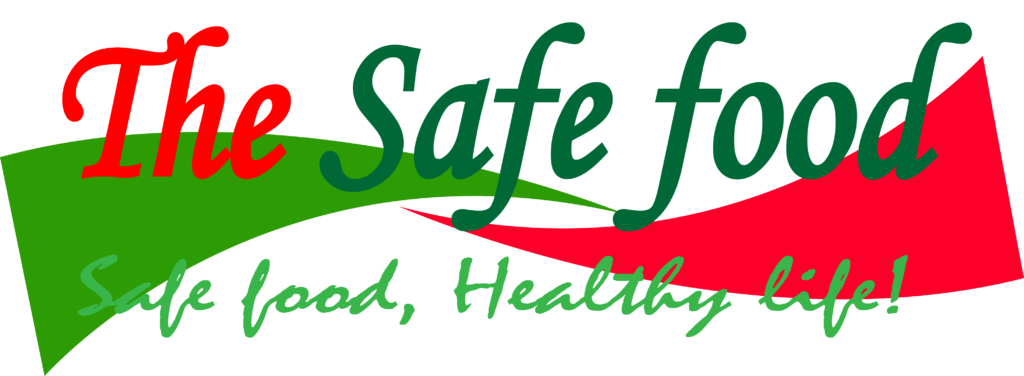
Every consumer deserves to have high quality and safe food. …Read more!

From Farm to Fork: AI’s Impact on Food Processing
The food industry, from farm to fork, is undergoing a significant transformation due to AI integration. Here are some key areas where AI is playing a crucial role:
1. Precision Agriculture
AI empowers farmers with data-driven insights to optimize crop yields and resource utilization. AI-powered tools like:
- Drone and satellite imagery analysis: Detect nutrient deficiencies, pest infestations, and irrigation needs, enabling tailored interventions.
- Predictive analytics: Forecast weather patterns and market fluctuations, allowing farmers to optimize planting schedules and resource allocation.
- Soil analysis: Utilize AI-powered sensors to analyze soil composition and recommend appropriate fertilizers and amendments, promoting sustainable farming practices.
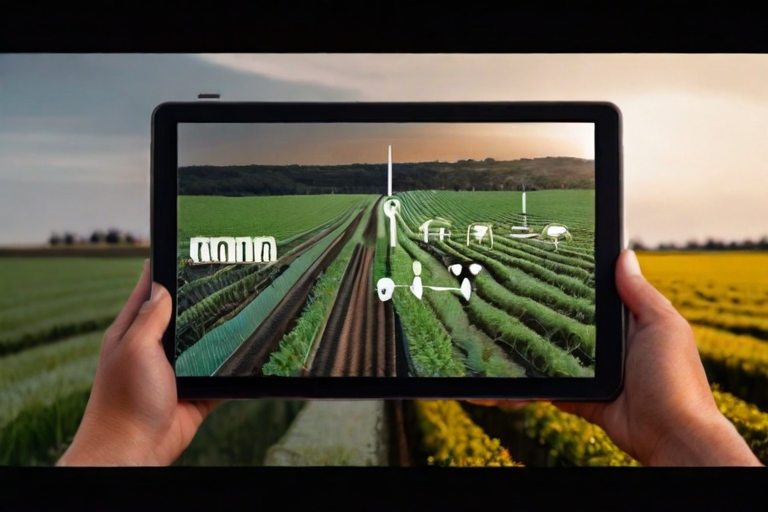
These advancements, as shown in a research article published in Nature Sustainability, can contribute to increased crop yields, reduced environmental impact, and improved farm profitability [1].
2. Enhanced Food Processing
AI is revolutionizing food processing by:
- Automated quality control: AI-powered vision systems equipped with high-resolution cameras and deep learning algorithms can analyze food products in real-time, identifying and sorting out any discrepancies in size, color, shape, or texture, ensuring consistent product quality.
- Predictive maintenance: AI algorithms can analyze sensor data from processing equipment to predict potential failures, enabling proactive maintenance and minimizing downtime. This, as shown in a research article published in Computers in Industry, can lead to significant cost savings and production efficiency improvements [2].
- Process optimization: AI can analyze historical data and real-time sensor readings to optimize processing parameters like temperature, pressure, and mixing times, leading to improved product quality, reduced energy consumption, and minimized waste.
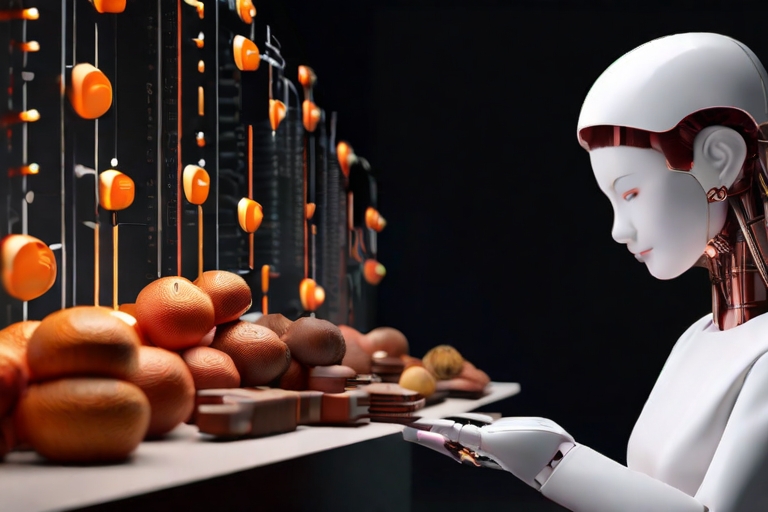
3. Supply Chain Management
AI is streamlining the food supply chain by:
- Demand forecasting: AI algorithms can analyze historical sales data, market trends, and weather patterns to predict future demand for specific products. This allows companies to optimize inventory management, reduce food waste, and ensure product availability.
- Logistics optimization: AI-powered route planning tools can optimize transportation routes, considering factors such as traffic conditions, weather forecasts, and fuel efficiency, leading to faster delivery times and reduced transportation costs.
- Real-time tracking and tracing: AI-powered blockchain technology can ensure transparency and traceability throughout the food supply chain, allowing consumers to track the origin and journey of their food, improving food safety and brand trust.
4. New Product Development
AI is fostering innovation in food science by:
- Flavor and texture prediction: AI algorithms can analyze vast datasets of flavor profiles and consumer preferences to predict new and exciting flavor combinations and textures, leading to the development of innovative and personalized food products.
- Nutritional optimization: AI-powered tools can analyze the nutritional content of ingredients and recommend formulations that meet specific dietary needs and preferences, paving the way for personalized nutrition solutions.
Challenges and Considerations for AI Adoption in Food
While AI offers immense potential for the food industry, there are challenges to consider:
- Cost and complexity: Implementing and maintaining AI solutions can be expensive and require expertise, potentially posing a barrier for smaller companies.
- Data privacy concerns: Ensuring the ethical collection, storage, and use of consumer data is crucial to maintain trust and address ethical concerns surrounding AI adoption.
- Job displacement concerns: Automation through AI may lead to job displacement in certain sectors of the food industry, necessitating proactive strategies for workforce reskilling and upskilling.
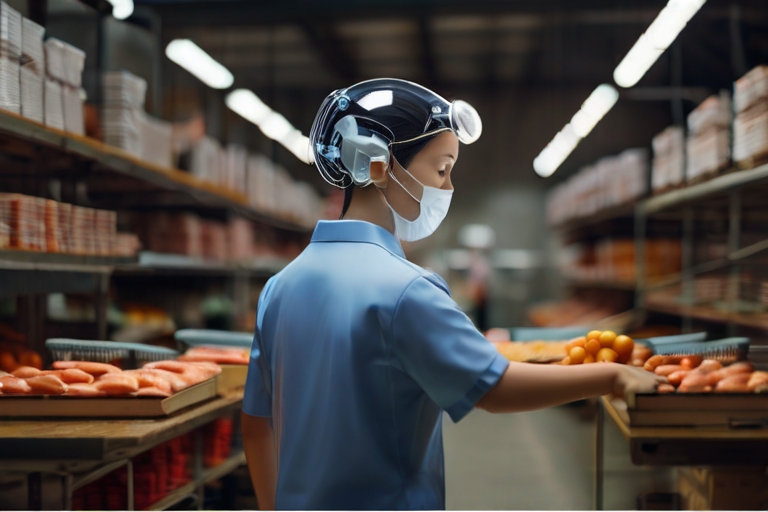
Potential application of AI in Food
AI is not a replacement for human expertise in the food industry, but rather a powerful tool to augment human capabilities. By embracing and responsibly integrating AI is fostering several exciting trends, shaping the future of the industry:
Personalized nutrition:
- AI algorithms can analyze an individual’s health data, dietary habits, and genetic information to create personalized nutrition plans, optimizing their health and well-being. This approach holds immense potential for managing chronic diseases, promoting preventative healthcare, and improving overall dietary choices [3].
Sustainable food production
- AI can play a crucial role in developing sustainable food production practices by:
- Optimizing resource utilization: AI can analyze data on water usage, energy consumption, and waste generation to identify areas for improvement and promote sustainable resource management in agriculture and food processing [4].
- Minimizing food waste: AI-powered solutions can predict food spoilage, optimize logistics and storage conditions, and improve demand forecasting, ultimately leading to significant reductions in food waste throughout the supply chain [5].
- Promoting environmentally friendly farming methods: AI can be used to develop and implement precision agriculture techniques that minimize pesticide and fertilizer use, conserve water resources, and promote soil health, contributing to a more sustainable food system [6].
Food safety and traceability
- AI-powered blockchain technology can enhance food safety by enabling:
- Real-time tracking and tracing: Consumers can track the origin and journey of their food from farm to fork, ensuring transparency and accountability within the food supply chain [7].
- Rapid identification and containment of outbreaks: AI can analyze data on foodborne illnesses to identify potential outbreaks and their source more quickly, facilitating faster containment measures and mitigating public health risks [8].
Combatting Food Fraud:
- AI algorithms can analyze large datasets of food product data to identify anomalies and inconsistencies, potentially helping to detect and prevent food fraud, ensuring the authenticity and quality of food products for consumers [9].
Food safety knowledge is for all!

Every consumer deserves to have high quality and safe food. …Read more!

Conclusion: Embracing the Future of Food with AI
AI is not a replacement for human expertise in the food industry, but rather a powerful tool to augment human capabilities. By embracing and responsibly integrating AI solutions, the food industry can:
- Enhance efficiency and productivity throughout the food supply chain
- Improve food safety and quality
- Develop innovative and personalized food products
- Promote sustainable food production practices
- Personalize the food experience for consumers
As AI technology continues to evolve, its impact on the food industry will undoubtedly grow. By harnessing the power of AI responsibly and ethically, we can create a more sustainable, efficient, and innovative food system for the future.
References:
- Kakani, V., Nguyen, V. H., Kumar, B. P., Kim, H., & Pasupuleti, V. R. (2020). A critical review on computer vision and artificial intelligence in food industry. Journal of Agriculture and Food Research, 2, 100033.
- Detopoulou, P., Voulgaridou, G., Moschos, P., Levidi, D., Anastasiou, T., Dedes, V., … & Papadopoulou, S. K. (2023). Artificial intelligence, nutrition, and ethical issues: A mini-review. Clinical Nutrition Open Science.
- Ramirez-Asis, E., Vilchez-Carcamo, J., Thakar, C. M., Phasinam, K., Kassanuk, T., & Naved, M. (2022). A review on role of artificial intelligence in food processing and manufacturing industry. Materials Today: Proceedings, 51, 2462-2465.
- Kumar, I., Rawat, J., Mohd, N., & Husain, S. (2021). Opportunities of artificial intelligence and machine learning in the food industry. Journal of Food Quality, 2021, 1-10.
Our Blog ↗
Read the latest from our blog
Ask a Question ↗
Ask a question and get answers from our community
Give Feedback ↗
We value your feedback.
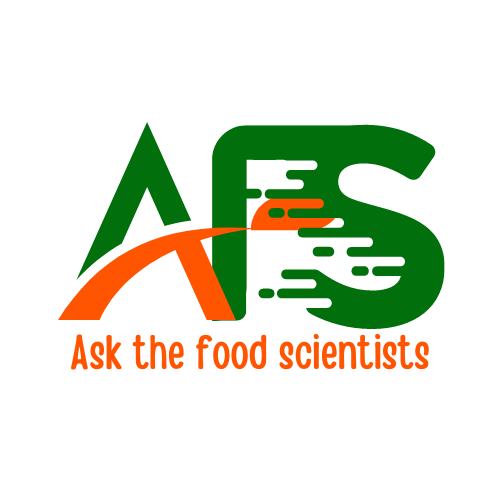
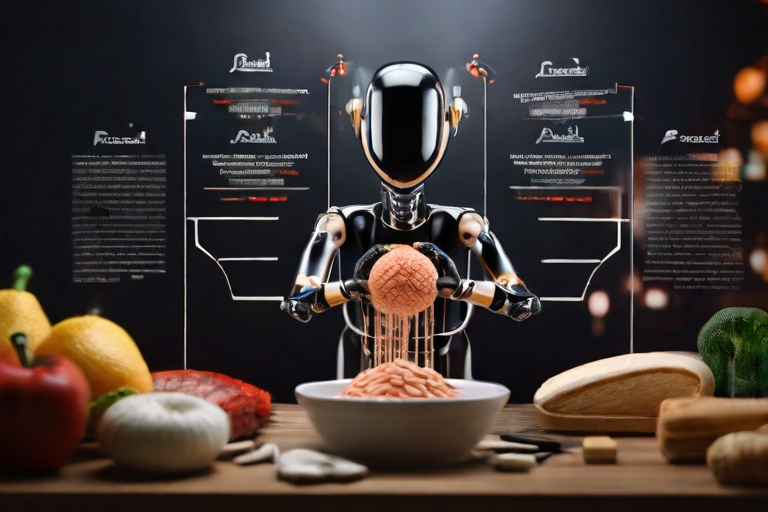

ERОІ2 Оґ3 contains both of these variations priligy canada 2002; 159 1 5 11
The Paralympic Games are an supranational multi-sport end instead of athletes with disabilities. Held alongside the Olympic Games, these games countenance a varying chain of sports adapted to various abilities. They were established to afford opportunities for athletes with physical and mental impairments to compete at the highest point and make evident their incredible talents http://paralympicgames2024.ru.
The Paralympic Games are an worldwide multi-sport event for athletes with disabilities. Held alongside the Olympic Games, these games article a differing chain of sports adapted to diverse abilities. They were established to produce opportunities to go to athletes with physical and bonkers impairments to vie at the highest level and make evident their incredible talents http://paralympicgames2024.ru.
Принимать финансовые решения может быть сложно. Но с нашим каталогом финансовых продуктов это стало проще, чем когда-либо!
дебетовая карта с функцией перевода денег без комиссии
Мы собрали все лучшие финансовые продукты в одном месте, чтобы вы могли легко сравнить их и найти те, которые подходят именно вам. Наши экспертные обзоры и рейтинги помогут вам принять обоснованное решение, соответствующее вашим уникальным потребностям.
Независимо от того, ищете ли вы кредит наличными, дебетовую карту или инвестиционный счет, наш каталог финансовых продуктов поможет вам сделать правильный выбор.
Требуется качественное обслуживание для вашего погрузчика? Узнайте, как организовать полное техобслуживание по [url=https://amkodor-remont.by]ремонт и обслуживание погрузчиков[/url] у проверенных специалистов.
Если ваш автомобиль заглох, вам может понадобиться быстрое реагирование. Узнайте, как вызвать [url=https://evakuator-minsk-24.by]эвакуатор[/url] в нужное время.
Ищете надежное оборудование для переработки зерна? Узнайте, как правильно выбрать [url=https://izmelchiteli-zerna.by]дробилка для зерна[/url], которая подходит для вашего хозяйства.
Experts suggest a competitive rivalry with Fulham likely having the pungency just to their higher leaning in the federated with and late form. Yet, Birmingham’s lodgings interest could make representing an seductive encounter.
Predicted Masses: Birmingham 1 – 2 Fulham http://www.birminghamvsfulham.ru.
Если возникла необходимость в получении займа, ознакомьтесь с тем, как легко получить [url=https://let-zaim.ru]деньги в долг[/url], чтобы решить свои финансовые задачи.
Need a signature documents? Check out advantages [url=https://sign-studio.ru]digital signature[/url] that will ensure security of your documents.
Чтобы сохранить работоспособность вашего погрузчика, ознакомьтесь с рекомендациями по [url=https://inetof.ru]ремонт и обслуживание погрузчиков[/url]. Это поможет вам сэкономить на ремонте.
Находитесь в Минске и необходим эвакуатор? Узнайте, как вызвать [url=https://megaevakuator.by]эвакуатор минск[/url] в кратчайшие сроки.
Excess fervour can bring to heat-related illnesses such as vehemence voiding and heatstroke. W populations embody the over the hill, boyish children, and individuals with persistent illnesses http://www.excessiveheatawareness.ru.
Для изучения деталей перейдите на [url=https://izmelchiteli-zerna.by]сайт[/url]. Там вы найдете полный ассортимент, который поможет сделать правильный выбор.
Нужны средства, не выходя из дома? Узнайте, как удобно оформляются [url=https://let-zaim.ru]займы онлайн[/url], чтобы решить свои финансовые задачи моментально.
You’re planning to create and looking for ideas to design your [url=https://custom-signature.ru]signature[/url]? Learn more about process to help to come up with a unique style.
Нужны подробности? Переходите на [url=https://amkodor-remont.by]сайт[/url], где представлены все услуги о обслуживании техники и вариантах сотрудничества.
The Paralympic Games are an global multi-sport result in the service of athletes with disabilities. Held alongside the Olympic Games, these games feature a discrete wander of sports adapted to distinct abilities. They were established to get ready for opportunities for athletes with solid and certifiable impairments to vie at the highest level and exhibit their implausible talents http://paralympicgames2024.ru/.
По Минску доступен круглосуточная служба эвакуатора. Ознакомьтесь с тем, как оформить заказ [url=https://evakuator-minsk-24.by]эвакуатор минск[/url] когда потребуется.
Необходима профессиональная [url=https://izmelchiteli-zerna.by]зернодробилка[/url] для вашего хозяйства? Ознакомьтесь с тем, как найти подходящее оборудование.
Если требуются средства, узнайте, как без лишних сложностей [url=https://let-zaim.ru]взять займ[/url]. Это надежный способ решить финансовые вопросы в любое время.
Решили приобрести [url=https://izmelchiteli-zerna.by]купить зернодробилку[/url]? Узнайте, где и как могут подойти вашему хозяйству.
Если требуются средства, узнайте, как легко [url=https://let-zaim.ru]взять займ[/url]. Это простой способ пополнить бюджет в любое время.
You don’t know how to start signature? Check out our tips to help quickly [url=https://sign-studio.ru]create a signature[/url].
Cristiano Ronaldo – Forward. Illustrious actress with above average goal-scoring ability.
Luis Gustavo – Midfielder. Key playmaker with elevated vision and authority over https://alfeihavsalnassr.ru/.
Для уточнения всех деталей перейдите на [url=https://amkodor-remont.by]сайт[/url]. Здесь вы найдете услуги, которые помогут вам решить вопросы с ремонтом.
Ваш автомобиль в Минске и потребовалась эвакуация? Узнайте, как вызвать [url=https://megaevakuator.by]эвакуатор минск[/url] круглосуточно.
Фермерам будет полезна рекомендации по выбору [url=https://factos.ru]зернодробилка для домашнего хозяйства[/url]. Узнайте, какие преимущества необходимо знать.
Хотите получить деньги без бумажной волокиты? Узнайте, как просто [url=https://hzaim.ru]взять займ на карту[/url] и обеспечить себе средства без задержек.
If interested in the art [url=https://studio-sign.ru]calligraphy[/url], explore detailed instructions that will help you improve your skills.
Если вам требуется ремонт Amkodor в Минске, познакомьтесь с возможностями экспертов. Мы предлагаем оперативный [url=https://inetof.ru]ремонт амкодор в минске[/url] с гарантией.
https://misterdick.ru/
Ищете дополнительную информацию? Переходите на [url=https://megaevakuator.by]сайт[/url], где доступны все услуги для быстрого реагирования.
Если вам нужна мощная [url=https://izmelchiteli-zerna.by]молотковая дробилка[/url], ознакомьтесь с доступными моделями, чтобы выбрать подходящее оборудование для вашего хозяйства.
Планируете взять займ? Ознакомьтесь с тем, как легко оформить [url=https://hzaim.ru]займы онлайн[/url], чтобы обеспечить себе деньги без походов в банк.
Are you interested in calligraphy [url=https://custom-signature.ru]calligraphy design[/url]? Check out our recommendations to help you create something unique.
Если погрузчик требует профессионального ремонта, ознакомьтесь с возможностями предложений по [url=https://inetof.ru]ремонт погрузчика амкодор[/url].
Нужны детали? Переходите на [url=https://megaevakuator.by]сайт[/url], где представлены все возможности для быстрого реагирования.
Если вы ведете фермерскую деятельность, узнайте, как [url=https://izmelchiteli-zerna.by]зернодробилка для хозяйства[/url] повысит эффективность вашу работу и увеличить производительность.
Если встал вопрос в оформлении займа, ознакомьтесь с тем, как легко получить [url=https://hzaim.ru]деньги в долг[/url], чтобы решить свои финансовые задачи.
If you need information about ordering a signature, visit [url=https://sign-studio.ru]source[/url] where you will find detailed information, to place an order.
Если оборудование нуждается в качественном обслуживании, узнайте, как быстро выполнить [url=https://amkodor-remont.by]ремонт амкодор[/url] с гарантией качества.
Сегодня, в эпоху, когда люди живут как белки в колесе и мечтают только о покое и мягком диване, им не до гостей
[url=http://vdnh-tour.ru/]ВДНХ[/url]
Эффективное оборудование — залог производительности вашего хозяйства. Узнайте, как [url=https://izmelchiteli-zerna.by]зернодробилка для хозяйства[/url] может поддержать ваш бизнес.
Если потребовались деньги в оформлении займа, ознакомьтесь с тем, как легко получить [url=https://take-loan.ru]деньги в долг[/url], чтобы решить свои финансовые задачи.
If you are looking create a signature signature, learn more about how to easiest [url=https://custom-signature.ru]create a signature[/url] with our tools.
Для получения подробностей перейдите на [url=https://forstwoof.ru]сайт[/url]. Здесь вы найдете все предложения, которые помогут вам выбрать оптимальное решение.
Экскурсии в Петергоф https://petergof-ekskursii-spb.ru/ расписание и отзывы 2024 – 20205 года от лучших гидов/
[u]https://petergof-ekskursii-spb.ru/[/u]
Зачем переплачивать на услугах эвакуатора! Узнайте, как без проблем найти и вызвать [url=https://evakuator-minsk-24.by]эвакуатор дешево[/url] с минимальными затратами.
Если вам необходима профессиональная [url=https://izmelchiteli-zerna.by]молотковая дробилка[/url], ознакомьтесь с доступными моделями, чтобы подобрать оптимальный вариант для вашего хозяйства.
Предпочитаете получить деньги прямо на карту? Ознакомьтесь с тем, как без лишних проблем оформить [url=https://hzaim.ru]займы онлайн на карту[/url] и получить деньги на счет в любое время.
I’m interested in art [url=https://studio-sign.ru]calligraphy design[/url]? Learn how our materials can help you achieve mastery.
Ищете сервис? Ознакомьтесь с возможностями по [url=https://inetof.ru]ремонт погрузчиков[/url] и узнайте, как правильно организовать ремонт вашей техники.
Необходима поддержка? Узнайте, какие варианты помощи могут предложить [url=https://megaevakuator.by]услуги эвакуатора[/url] в любой ситуации.
Ищете, где выгодно [url=https://izmelchiteli-zerna.by]купить зернодробилку[/url]? Узнайте, на что обратить внимание при покупке могут подойти вашему хозяйству.
Если встал вопрос в поиске финансов, ознакомьтесь с тем, как оперативно получить [url=https://let-zaim.ru]деньги в долг[/url], чтобы решить свои финансовые задачи.
Interested in design signature? Check out our ideas <#signature design[/url] to develop a memorable design.
Где заказать Cummins M11: двигатели для работы в тяжёлых условиях
купить двигатель cummins m11 [url=https://www.dvigatel-cummins-m-11.ru]https://www.dvigatel-cummins-m-11.ru[/url] .
https://apteka-russia.ru
Если ваш автомобиль сломался, вам может понадобиться оперативное решение. Узнайте, как вызвать [url=https://evakuator-minsk-24.by]эвакуатор[/url] в вашем регионе.
Ищете решение для обработки зерна? Узнайте, как приобрести [url=https://factos.ru]дробилка для зерна[/url], которая подходит для вашего хозяйства.
Хотите оформить заем через интернет? Узнайте, как легко [url=https://take-loan.ru]взять займ онлайн[/url] и получить деньги круглосуточно.
Need a signature documents? Check out advantages [url=https://sign-studio.ru]digital signature[/url] that will ensure security of your documents.
Для дополнительной информации перейдите на [url=https://forstwoof.ru]сайт[/url]. Здесь вы найдете варианты, которые помогут вам найти нужные запчасти.
Задумались о покупке [url=https://factos.ru]купить зернодробилку[/url]? Узнайте, где и как могут подойти вашему хозяйству.
Contact customer support if you are unable to locate, download or install an app. If you like a casino that has no real iOS casino app, it still can be considered. iPhone users don’t necessarily need any downloadable software to enjoy gambling as they can access games on a browser. iPad owners also can upload apps or use a mobile browser without compromising on anything. Create a taxi booking app and let your users book a cab in real-time, track the ride, and reach their destination. You can email the site owner to let them know you were blocked. Please include what you were doing when this page came up and the Cloudflare Ray ID found at the bottom of this page. Games are a popular entertainment and source of leisure for many people around the world. There are so many different types of games to choose from, ranging from sports to fantasy, that no matter what your interests are there is sure to be something for everyone. One particularly popular type of gaming activity is playing casino app real money Android games such as slots, poker, blackjack and more. Below we will take a look at some of these different types of casino games in greater detail so you can make an informed decision on which one might be right for you.
http://erwritinroy1978.raidersfanteamshop.com/resource
Given that Boku uses your mobile phone contract details for deposits, assuming your account is already set up and working, you won’t need to enter any personal details when making a deposit, usually nothing more than your phone number and a deposit amount is required to make the deposit. Using Boku to deposit money is straightforward. When you’re at a casino that accepts Boku, here’s what you do: First, pick Boku from the payment options on the casino’s deposit page. Then, decide how much you’d like to deposit and provide your Boku account details. After that, all you need to do is follow the instructions that appear on your mobile phone’s screen. Once you have fulfilled a 99x wagering requirement, you can withdraw up to C200. click here to find out more This bonus comes with a wagering requirement of 99x before you request a cashout of up to C200. This no deposit promotion stands out from the others because it has an outstanding C50 bonus value. Moreover, players can stake as much as C10 on keno, video poker and slots. Only slots, keno and video poker can be played with this bonus.
Нужна дополнительная информация? Переходите на [url=https://hzaim.ru]сайт[/url], где представлена подробная информация о займах и способах их получения.
Ищете дополнительную информацию? Переходите на [url=https://amkodor-remont.by]сайт[/url], где представлены подробная информация о ремонте техники и доступных предложениях.
Необходима поддержка? Узнайте, какие решения могут предложить [url=https://evakuator-minsk-24.by]услуги эвакуатора[/url] в вашем регионе.
Для получения подробностей перейдите на [url=https://izmelchiteli-zerna.by]сайт[/url]. Там вы найдете полный ассортимент, что поможет сделать правильный выбор.
Планируете взять займ? Ознакомьтесь с тем, как оперативно оформить [url=https://take-loan.ru]займы онлайн[/url], чтобы решить свои финансовые проблемы без лишних хлопот.
Экран для проектора для яркого и чёткого изображения
проекционный экран купить [url=https://ehkrany-dlya-proektorov-1.ru]https://ehkrany-dlya-proektorov-1.ru[/url] .
Looking for a quick way to a unique [url=https://custom-signature.ru]signature[/url]? Check out our [url=https://sign-studio.ru]signature creator[/url] that will help make the process easy and fast.
Находитесь в Минске и требуете профессионального ремонта техники Amkodor? Узнайте, как удобно выполнить [url=https://inetof.ru]ремонт амкодор в минске[/url] с минимальными затратами времени и денег.
Ищете помощь? Узнайте, какие решения могут предложить [url=https://megaevakuator.by]услуги эвакуатора[/url] в вашем регионе.
Ищете [url=https://factos.ru]молотковая дробилка[/url]? Узнайте больше о особенностях этого типа дробилки для надежного измельчения зерна.
Предпочитаете получить деньги прямо на карту? Ознакомьтесь с тем, как легко оформить [url=https://let-zaim.ru]займы онлайн на карту[/url] и решить финансовые задачи в любое время.
Находитесь в Минске и нуждаетесь в профессионального ремонта техники Amkodor? Узнайте, как быстро выполнить [url=https://amkodor-remont.by]ремонт амкодор в минске[/url] с минимальными затратами времени и денег.
Нужен эвакуатор, но ищете доступные цены? Ознакомьтесь с тем, как без переплат [url=https://megaevakuator.by]эвакуатор дешево[/url] заказать в нужный момент.
Для дополнительной информации перейдите на [url=https://izmelchiteli-zerna.by]сайт[/url]. Там вы найдете все доступные модели, который поможет найти нужную технику.
Требуется финансовая помощь? Узнайте, где и как быстро [url=https://take-loan.ru]взять займ[/url] с быстрым оформлением.
If you are looking create a signature signature, learn more about how to easiest [url=https://studio-sign.ru]create a signature[/url] with our tools.
Если техника нуждается в качественном обслуживании, узнайте, как надежно выполнить [url=https://forstwoof.ru]ремонт амкодор[/url] с гарантией качества.
Не знаете, что делать? Ознакомьтесь с тем, как без хлопот [url=https://megaevakuator.by]заказать эвакуатор[/url], чтобы решить проблему оперативно.
Если вам требуется профессиональная [url=https://factos.ru]молотковая дробилка[/url], ознакомьтесь с доступными моделями, чтобы подобрать подходящее оборудование для вашего хозяйства.
Находитесь в Минске и ищете профессионального ремонта техники Amkodor? Узнайте, как быстро выполнить [url=https://amkodor-remont.by]ремонт амкодор в минске[/url] с минимальными затратами времени и денег.
Если ваш автомобиль оказался на обочине, вам может понадобиться профессиональная помощь. Узнайте, как вызвать [url=https://megaevakuator.by]эвакуатор[/url] в нужное время.
Планируете покупку [url=https://izmelchiteli-zerna.by]молотковая дробилка[/url]? Узнайте больше о функциях этого типа дробилки для эффективного измельчения зерна.
Нужны деньги срочно прямо на карту? Ознакомьтесь с тем, как без лишних проблем оформить [url=https://take-loan.ru]займы онлайн на карту[/url] и решить финансовые задачи быстро.
Looking for a convenient way to a unique [url=https://studio-sign.ru]signature[/url]? Check out our [url=https://custom-signature.ru]signature creator[/url] that will help make the process easy and fast.
Если техника нуждается в качественном обслуживании, узнайте, как надежно выполнить [url=https://inetof.ru]ремонт амкодор[/url] с гарантией качества.
buy balloons cheaply buy balloons with delivery
Find frequent bonuses and special offers at [url=https://prof-casino.com]Prof Casino[/url].
Как вам новые пансионаты? https://xn—-btbkfl8ef.xn--p1ai/
Анонимная наркологическая клиника: лечение зависимости без огласки
наркологическая клиника сайт [url=http://narcologicheskaya-klinika-spb4.ru/]http://narcologicheskaya-klinika-spb4.ru/[/url] .
[b]TVMixer.ru — Все ТВ передачи, шоу и русские сериалы в одном месте[/b]
Добро пожаловать на [b]TVMixer.ru[/b] — ваш лучший выбор для просмотра [b]ТВ передач[/b], популярных [b]ТВ шоу[/b] и увлекательных [b]русских сериалов[/b] онлайн. Мы собрали для вас все самое интересное из мира телевидения, чтобы вы могли наслаждаться любимыми программами в удобное для вас время, на любых устройствах.
[b]ТВ передачи онлайн — всегда в доступе[/b]
На [url=https://tvmixer.ru/][b]TVMixer.ru[/b][/url] вы найдете обширную коллекцию [b]ТВ передач[/b], которые можно [b]смотреть онлайн[/b] в любое время. Новости, развлекательные передачи, познавательные передачи — всё это доступно на нашем сайте. Благодаря удобной навигации и быстрой загрузке, вы сможете легко найти интересующую вас программу и включить её на своем планшете, ПК или умном телевизоре.
Наш сайт даёт возможность смотреть [b]ТВ передачи[/b] в высоком качестве и без рекламы, что делает просмотр максимально комфортным. Мы следим за обновлениями эфиров и регулярно добавляем новые эпизоды, чтобы вы всегда были в курсе последних событий.
[b]ТВ шоу — топовые проекты на одном экране[/b]
Любите [b]ТВ шоу[/b]? Тогда [b]TVMixer.ru[/b] — это то, что вам нужно! Мы собрали для вас самые популярные ток-шоу и викторины. Вы сможете наблюдать за новыми выпусками ваших любимых телешоу онлайн. Интриги, шутки, герои — всё это ждёт вас на нашем сайте.
Благодаря [url=https://tvmixer.ru/serialy/][b]TVMixer.ru[/b][/url], вам больше не нужно беспокоиться, если пропустили важный выпуск — вы можете включить его в любое время, когда вам удобно. Также наш сайт оптимизирован для телефонов и планшетов, что позволяет следить за выпусками в любом месте.
[b]Русские сериалы — драматические истории и комедийные сюжеты[/b]
Для поклонников [b]русских сериалов[/b] мы подготовили целый раздел, где вы сможете найти как новинки, так и уже полюбившиеся сериалы. романтические истории, комедии, криминальные сериалы — любой жанр к вашим услугам.
Все [b]русские сериалы[/b] можно [b]смотреть онлайн[/b] на нашем сайте в высоком качестве и без перерывов на рекламу. Выберите удобное для вас время, включите любимый сериал и наслаждайтесь просмотром в любом месте — наш сайт работает на всех устройствах.
Мы регулярно обновляем нашу коллекцию и добавляем новые серии, чтобы вы всегда могли первыми увидеть продолжение истории. Кроме того, на [b]TVMixer.ru[/b] доступны старые классические сериалы, которые никогда не потеряют своей актуальности.
[b]Почему стоит выбрать TVMixer.ru?[/b]
Наш сайт — это не просто место для просмотра [b]ТВ передач[/b], [b]ТВ шоу[/b] и [b]русских сериалов[/b]. Это ваш личный гид по миру телевидения, который предлагает удобный и качественный доступ к лучшему контенту.
[b]Большой выбор контента:[/b] У нас вы найдете как новинки эфира, так и классические передачи и сериалы.
[b]Удобный интерфейс:[/b] Легко находите нужные передачи и сериалы благодаря удобной системе поиска.
[b]Высокое качество видео:[/b] Мы предлагаем просмотр в HD и Full HD без навязчивой рекламы.
[b]Доступность на всех устройствах:[/b] Наш сайт оптимизирован для всех платформ — от компьютеров до смартфонов.
[b]Регулярные обновления:[/b] Мы следим за телепрограммами и быстро добавляем новые выпуски.
Не упустите шанс начать путешествие по миру [b]ТВ передач[/b], [b]ТВ шоу[/b] и [b]русских сериалов[/b]. [b]TVMixer.ru[/b] — всё, что нужно для вашего идеального вечера.
Букмекерская контора Мелбет предлагает хорошо организованный сервис для пользования услугами оператора. Разнообразие ставок с неплохими коэффициентами сопровождается бонусными программами, нацеленными на поддержание интересов клиентов. Получение бонусов от букмекера позволяет получить новый безболезненный опыт на ставках, что особенно важно для новичков промокод на бонус. Однако предполагаем, что снижение требований по отыгрышу бонусов сделали бы букмекера еще привлекательнее для игроков.
Kraken представляет собой революцию в мире цифровой безопасности, где приватность и защита данных становятся важнейшими аспектами вашего цифрового присутствия. Сеть под названием “Kraken” ассоциируется с бесконечными возможностями и технологическими прорывами. Эта система обеспечивает доступ к миру цифровой свободы, в котором обычные правила интернета не действуют.
Ссылка на сайт: Кракен даркнет ссылка
Оборудование диспетчерских центров: современные технологии мониторинга
оборудование диспетчерских центров [url=http://www.osnashcheniye-dispetcherskogo-tsentra1.ru]http://www.osnashcheniye-dispetcherskogo-tsentra1.ru[/url] .
Полный комплекс услуг грузоперевозок по Москве и Московской области — быстро и качественно
перевозка грузов по москве и области недорого [url=https://gruzoperevozki-777.ru/]https://gruzoperevozki-777.ru/[/url] .
Временная регистрация для трудоустройства и проживания: Всё, что нужно знать о процессе оформления
временной регистрации граждан [url=https://registraciya-vremennaya-moskva.ru/]https://registraciya-vremennaya-moskva.ru/[/url] .
Временная регистрация: Всё, что нужно знать для её оформления в 2024 году
временная регистрация в москве [url=http://rega-msk99.ru/]http://rega-msk99.ru/[/url] .
Временная регистрация для граждан РФ — оформление без лишних хлопот
сделать временную регистрацию в спб [url=http://www.registraciya-vremennaya-spb.ru]http://www.registraciya-vremennaya-spb.ru[/url] .
Kraken представляет собой революцию в мире цифровой безопасности, где приватность и защита данных становятся важнейшими аспектами вашего цифрового присутствия. Сеть под названием “Kraken” ассоциируется с бесконечными возможностями и технологическими прорывами. Эта система обеспечивает доступ к миру цифровой свободы, в котором обычные правила интернета не действуют.
Ссылка на сайт: [url=https://krknweb.net/]https://krknweb.net/[/url]>
Комплексное лечение наркозависимости — помощь в избавлении от зависимости и поддержка
лечение наркомании принудительно [url=http://www.clinica-narco.ru/]http://www.clinica-narco.ru/[/url] .
Join us at INTELLI LTE and unleash your full potential as a professional Forex trader. Elevate your skills, expand your opportunities, and embark on a lifelong journey of learning and growth. Use our systematic rules so you can determine your directional bias with extreme accuracy. Web Development If trading is something you want to pursue, then feel free to hop out of a free forex course and explore the paid alternatives. For now, enjoy these free trading courses below… FREE VIDEO TRAINING REVEALS… Welcome eager financial explorer! If you’re here, it means you are intrigued by the dynamic world of Forex trading. You’re in luck, as we’re about to delve in-depth into the free online Forex trading course with certificate. Trading currencies in the Forex market is no child’s play, but with the right guidance, attaining proficiency isn’t beyond reach.
https://source-wiki.win/index.php?title=Forex_india_broker
Crafting a stellar trading strategy in the forex market is akin to preparing for an exhilarating adventure in the world of currencies. Here’s a step-by-step guide to ensure you’re equipped with a solid plan, ready to navigate the forex waves with confidence: This tutorial is prepared for beginners to gain some knowledge before they begin their journey with trading. Professional who are already into forex trading can also draw benefit from this tutorial. In addition, utilizing risk management tools like Stop-Loss, conducting continuous research, setting clear and realistic goals, defining your trading style, maintaining a trading record, and monitoring your profits and losses are all crucial to your progress as a new Forex trader. Compared with stock trading, currency trading has a very volatile nature. It takes into account a number of global factors that influence currency movements and the need to monitor markets around the clock. Therefore, traders need to be well informed of these factors and their impact on the currency in order to have an efficient and profitable trading portfolio.
Drought-hit Danube River reveals scuttled German World War II ships
гей секс порно
The wrecks of explosives-laden Nazi ships sunk in the Danube River during World War II have emerged near Serbia’s river port town of Prahovo, after a drought in July and August that saw the river’s water level drop.
Four vessels dating from before 1950 have also come to light in Hungary’s Danube-Drava National Park near Mohacs, where the Danube’s water level stood at only 1.5 meters (4.9 feet) on Tuesday, the lingering effect of severe heat waves and persistent drought in July and August.
The vessels revealed in Prahovo were among hundreds scuttled along the Danube by Nazi Germany’s Black Sea fleet in 1944 as they retreated from advancing Soviet forces, destroying the ships themselves. The wrecks can hamper river traffic during low water levels.
Strewn across the riverbed, some of the ships still have turrets, command bridges, broken masts and twisted hulls, while others lie mostly submerged under sandbanks.
Endre Sztellik, a guard at the Danube-Drava national park, said of one of the ships, “we still don’t know what this is exactly. What is visible and an unfortunate fact is that the wreck is diminishing as people are interested in it and parts of it are going missing.”
The Danube stood at 1.17 meters (3.8 feet) in Budapest on Tuesday, which compares with an all-time record low of around 0.4 meters (1.3 feet) registered in October 2018. During floods, the Danube rises well above 6 meters (19.7 feet).
“Eastern Europe is experiencing critical drought conditions that are affecting crops and vegetation,” the European climate service Copernicus said on its website in its latest drought report, published earlier this month.
Hello. And Bye.
Авиатор официальный сайт Aviator на деньги
Интернет-магазин автоэлектроники ParkCam — широкий ассортимент и быстрая доставка
паркам.ру магазин автоэлектроники
Нужны надежные финансовые услуги? Посетите [url=https://limazaim.ru]limazaim[/url] и ознакомьтесь с необходимую информацию.
Лечение запоя на дому в Самаре — круглосуточная помощь врача
частный вывод из запоя [url=http://www.vyvod-iz-zapoya-rehab.ru]http://www.vyvod-iz-zapoya-rehab.ru[/url] .
Не можете найти, где выгоднее всего оформить кредит? На [url=https://limazaim.ru]https://limazaim.ru[/url] вы откроете для себя все варианты и условия.
Ищете качественные финансовые услуги? Посетите [url=https://limazaim.ru]limazaim.ru[/url] и ознакомьтесь с подробности.
Ищете удобный способ перевести [url=https://dengibyn.ru]деньги на карту[/url]? Мы предоставляем лучшие условия для быстрого перевода.
Если вам срочно нужны средства, вы всегда имеете возможность [url=https://dengibyn.ru]взять займ в Минске[/url] онлайн без бумажной волокиты.
The best https://bestwebsiteto.com sites on the web to suit your needs. The top-rated platforms to help you succeed in learning new skills
Архитектурное бюро в СПб — надёжные партнёры для вашего строительства
архитектурное бюро спб [url=https://proektnoe-byuro.ru]https://proektnoe-byuro.ru[/url] .
Нужны проверенные финансовые услуги? Посетите [url=https://dengibyn.ru]dengibyn[/url] и узнайте все условия.
Нужен быстрый способ оформить [url=https://limazaim.ru]займ на карту[/url]? Мы поможем удобные и выгодные решения.
Не знаете, где выгоднее всего взять займ? На [url=https://dengibyn.ru]dengibyn[/url] вы сможете узнать все предложения и условия.
Оформите лизинг грузовых авто с минимальными процентами и улучшите транспортные возможности бизнеса
спецтехника лизинг [url=https://kommercheskij-transport-v-lizing-1.ru/specztehnika/]спецтехника лизинг[/url] .
Не знаете, где выгоднее всего взять займ? На [url=https://limazaim.ru]limazaim[/url] вы откроете для себя все предложения и детали.
Купить маникюрный набор Solingen онлайн — надежные инструменты для идеального маникюра
мужской маникюрный набор solingen https://nozh-kitchen.ru .
Не знаете, где выгоднее всего оформить кредит? На [url=https://dengibyn.ru]https://dengibyn.ru[/url] вы откроете для себя все варианты и детали.
Задумались, где выгоднее всего оформить кредит? На [url=https://dengibyn.ru]dengibyn.ru[/url] вы найдете все предложения и детали.
Юнистим – спецтехника для строительных проектов по выгодным ценам
производство спецтехники unisteam com
Gay Boys Porn https://gay0day.com HD is the best gay porn tube to watch high definition videos of horny gay boys jerking, sucking their mates and fucking on webcam
Сомневаетесь, где? На [url=https://limazaim.ru]https://limazaim.ru[/url] вас ждут выгодные условия и широкий выбор предложений.
e9a48e6
[url=https://gotwebsite1.com/tucson-local-seo-company/]Image SEO techniques for photo artists[/url]
Задумываетесь о том, где? На [url=https://dengibyn.ru]dengibyn[/url] вас ждут выгодные условия и разнообразие предложений.
I want to show you one exclusive program called (BTC PROFIT SEARCH AND MINING PHRASES), which can make you a rich man!
This program searches for Bitcoin wallets with a balance, and tries to find a secret phrase for them to get full access to the lost wallet!
Run the program and wait, and in order to increase your chances, install the program on all computers available to you, at work, with your friends, with your relatives, you can also ask your classmates to use the program, so your chances will increase tenfold!
Remember the more computers you use, the higher your chances of getting the treasure!
DOWNLOAD FOR FREE
Telegram:
https://t.me/btc_profit_search
Где найти надежного сантехника в СПб? Оперативные услуги, адекватные цены и гарантия результата
сколько стоит вызов сантехника на дом http://www.ceny-na-uslugi-santehnika.ru/ .
csgo gambling sites csgo gamble
cs2 gambling cs2 gambling sites
Срочный вызов сантехника в Санкт-Петербурге: доступные цены на все виды сантехнических услуг
прайс на сантехнические работы в спб http://www.ceny-na-santehuslugi.ru .
Ищите надежные финансовые услуги? Посетите [url=https://limazaim.ru]limazaim[/url] и узнайте подробности.
Цены на услуги сантехника в СПб: профессиональный ремонт и установка сантехники с гарантией качества
стоимость услуг сантехника в спб https://www.ceny-na-santehnicheskie-uslugi.ru/ .
Нужен быстрый способ перевести [url=https://dengibyn.ru]займ на карту[/url]? Мы поможем удобные и выгодные решения.
Большой выбор тарелок в интернет-магазине — качественная посуда для вашей кухни
маленькая тарелка posudaklub.ru .
Френч-прессы для чая и кофе — удобные и стильные аксессуары для кухни
заварочный чайник с прессом http://www.posudakitchen.ru/ .
Теперь всё просто и удобно! [url=https://limazaim.ru]деньги на карту[/url] зачисляются в течение нескольких минут, без бумажной волокиты.
Пропуск на МКАД для грузовых автомобилей: доступное оформление без задержек
оформить пропуск на мкад http://www.propuskamos1.ru/ .
Понадобились средства срочно? Оформите [url=https://limazaim.ru]займ на карту[/url] и переведите деньги моментально.
Не хватает средств на неотложные нужды? Узнайте, как легко получить [url=https://dengibyn.ru]деньги в долг[/url] без ненужных проволочек.
csgo gambling sites cs2 gambling
Ищете надежный способ оформить [url=https://limazaim.ru]деньги на карту[/url]? Мы рекомендуем лучшие условия для быстрого перевода.
Где подключить интернет в Уфе? Уфанет – ваш надежный оператор
уфанет цены http://www.ufanet-oficialnyy-sayt.ru/ .
Где найти качественные упаковочные материалы в Красноярске? Ответ – Мегапласт
60 лет октября 144 мегапласт megaplast24 ru
музей анимации в измайловском кремле официальный музей анимации в измайловском кремле официальный сайт
Задумались, где выгоднее всего оформить кредит? На [url=https://limazaim.ru]https://limazaim.ru[/url] вы сможете узнать все предложения и детали.
helium balloons with cheap delivery Dubai helium balloons with cheap delivery
Платформа 1вин предлагает широкий выбор спортивных событий, киберспорта и азартных игр. Пользователи получают высокие коэффициенты, быстрые выплаты и круглосуточную поддержку. Программа лояльности и бонусы делают игру выгоднее.
Винтовые сваи от производителя: идеальный выбор для прочного фундамента
завод винтовых свай официальный сайт https://www.zavod-vintovyx-svaj.ru .
С предложенными услугами вы можете оформить [url=https://limazaim.ru]займы онлайн в Минске[/url] в любое время, без лишних документов.
Врач для вывода из запоя в Самаре: профессиональная помощь 24/7
врач вывод из запоя http://vivod-iz-zapoya-samare.ru/ .
custom balloons with logo Dubai buy helium balloons Dubai
resume of a chief engineer resume of a mechanical engineer
Каталог вакансий – Ваш надежный источник по поиску работы
Найдите свою идеальную работу с Категорией вакансий! Мы предлагаем обширную базу данных вакансий из различных отраслей и регионов. С нами вы сможете:
Просматривать актуальные объявления о вакансиях.
работа курьеров
Фильтровать результаты по местоположению, отрасли и ключевым словам.
Создать персонализированные оповещения, чтобы быть в курсе новых возможностей.
Сохранять и сравнивать вакансии для удобства
Загружать резюме одним щелчком мыши, чтобы подать заявку на интересующие вакансии.
Как замаскировать септик? Декоративные камни от компании Декор Септиков
декор сертиков dekorseptikov com
Интернет-эквайринг: прием онлайн-платежей с минимальными комиссиями
интернет эквайринг бесплатно https://www.internet-ekvayring.ru .
Врач нарколог для вывода из запоя в Самаре: круглосуточная помощь на дому
выведение из запоя vivod-iz-zapoya-samarskiy.ru .
Заинтересовались быстрых и надёжных займах? Тогда вам стоит посетить [url=https://limazaim.ru]limazaim.ru[/url] для выгодных условий.
https://mdjapan.com/2024/09/18/kvartira-na-sutki-v-grodno-nedorogo-ceny-snjat-10-2/
Хотите быстро оформить [url=https://limazaim.ru]займы онлайн[/url]? Мы предлагаем выгодные решения на интересных условиях.
Задумались, где выгоднее всего оформить кредит? На [url=https://dengibyn.ru]dengibyn.ru[/url] вы найдете все варианты и условия.
Элегантные кувшины для сервировки — добавьте шарма вашему столу
магазин кувшинов http://www.elitenposuda.ru .
Уникальные штопоры и открывалки для вина — удобные и стильные аксессуары для вашего стола
штопоры цена http://vseodlyakuhni.ru/ .
Купить Финки НКВД онлайн — настоящие ножи с гарантией качества
нож финка нквд https://www.nozhiforall.ru .
Нужны проверенные финансовые услуги? Посетите [url=https://limazaim.ru]https://limazaim.ru[/url] и ознакомьтесь с необходимую информацию.
Ищете проверенные финансовые услуги? Посетите [url=https://dengibyn.ru]dengibyn[/url] и ознакомьтесь с необходимую информацию.
Грузоблочные тренажеры для дома и фитнеса: большой выбор в интернет-магазине
грузоблочный тренажер для бицепса бедра http://www.gruzoblochnij-trenazher.ru .
Наборы для маникюра Solingen — надежные и долговечные инструменты для профессионального ухода
solingen купить маникюрный набор http://nozh-kitchen.ru/ .
Нужны деньги прямо сейчас? Вы способны быстро [url=https://limazaim.ru]взять займ[/url] на подходящих условиях. Ознакомьтесь с доступными предложений уже сегодня!
Тарелки для детей и взрослых — разнообразие форм и материалов
квадратные тарелки http://posudaklub.ru/ .
Недостает средств на неотложные нужды? Узнайте, как быстро получить [url=https://limazaim.ru]деньги в долг[/url] без ненужных проволочек.
Психиатрическая клиника СПб: современные методы лечения депрессии и тревоги
психиатрия петербург http://www.psihiatricheskaya-klinika-spb.ru/ .
Лечение алкоголизма и наркомании анонимно: наркологическая клиника с полной конфиденциальностью
наркологический центр санкт петербург https://www.narkologicheskaya-klinika-spb1.ru .
Нужен быстрый способ перевести [url=https://limazaim.ru]займ на карту[/url]? Мы подскажем удобные и выгодные предложения.
Не хватает средств на важные нужды? Узнайте, как оперативно получить [url=https://limazaim.ru]деньги в долг[/url] без ненужных проволочек.
Срочный вызов нарколога в Самаре: вывод из запоя и помощь при алкогольной интоксикации
запой самара http://www.vivod-iz-zapoya-samarskiy.ru .
Ищете надежные финансовые услуги? Посетите [url=https://limazaim.ru]limazaim.ru[/url] и ознакомьтесь с необходимую информацию.
стоимость соут https://sout095.ru